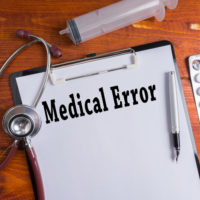Errors Involving High-Alert Medication Can Have a Lasting Impact

Medical errors are the third-highest cause of death in the US, according to a recent study by Johns Hopkins University. Among the most serious forms of medical error are those regarding the administration of prescription drugs. While prescription medications can do enormous good in bringing patients back from the edge of death, they hold equal potential to do harm if given in the wrong dosage or to the wrong patient. Hospital patients are especially at risk to be the victim of medication errors, since nurses and doctors are responsible for administering medication to so many patients simultaneously. Additionally, these individuals are even more vulnerable to harm from receiving the wrong drug, since so many are in a physically compromised state and are already taking medications with which the wrong drug could have a harmful interaction.
Errors in medication administration can occur in any number of ways, including: communication failures among hospital staff, failure by the doctor to prescribe the correct medication, incorrect dosage amounts of a drug, negligent design of drug packaging, or negligent manufacture of the drug itself. The type of error will determine what sort of claim can be filed that will compensate the error victim for their medical expenses and pain and suffering.
Medical professionals must exercise even greater care in administering medications when these drugs are categorized as “high-alert medications.” These drugs are some of the most potent, and potentially harmful, in any hospital setting.
High-alert medications, sometimes known as HAMs, can be divided into four categories:
- Anticoagulants: Anticoagulants are prescribed to prevent blood clots in patients at risk of such conditions as embolisms or stroke. Drugs such as heparin, warfarin, and rivaroxaban are examples of popular anticoagulants. Errors involving these drugs most often fall into the category of errors in dosage calculation or other administration mistakes. Mistakes can also include forgetting to restart anticoagulant dosage after a patient has undergone surgery, resulting in the patient forming a blood clot and suffering a negative health event as a result.
- Opioids: These drugs are highly powerful analgesics, or pain relievers. Often, opioid administration errors result from patients receiving opioids through patient-controlled analgesia pumps. These pumps allow the patient to decide how much pain medication they need, but if the pump is programmed incorrectly, or the wrong drug is used in the pump, patients can suffer serious harm.
- Sedatives: Patients typically receive sedatives before undergoing surgical procedures. When issued in excessive quantities, these drugs can be highly dangerous, especially if the patient is also on opioid painkillers. Patients may become dizzy, disoriented, unable to walk, or experience serious depression of their central nervous system.
- Insulin: Diabetics need insulin to regulate their blood sugar, but the drug must be issued in very precise amounts to each patient. Hospitals often make mistakes in issuing insulin when nurses or doctors use an unfamiliar type of syringe or insulin pen that provides too much of the drug, or when different types of insulin are stored near one another on hospital shelves or are labeled similarly.
If you or someone you love has been harmed by a medication error in Indiana, contact the experienced and compassionate Indianapolis medical malpractice attorneys at Lee Cossell & Feagley, LLP for a consultation on your case, at 317-631-5151.


